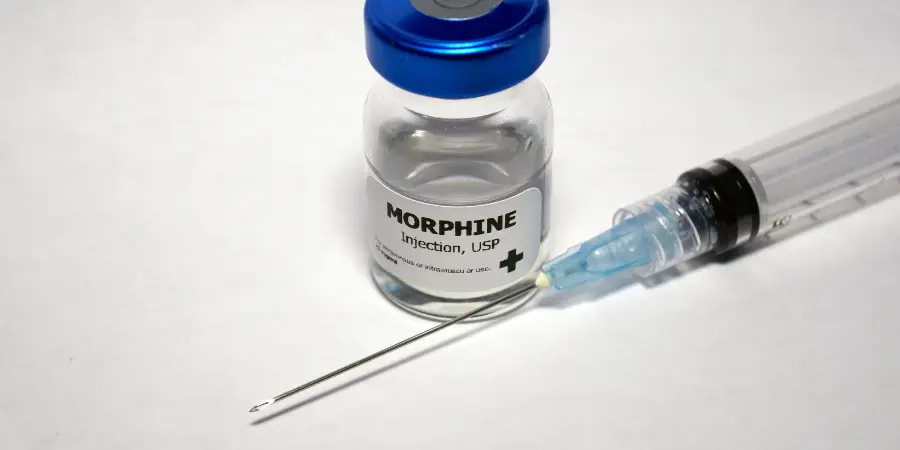
Written by:

Medically Reviewed by:
Last Updated:
August 7th, 2025
Morphine Addiction | Symptoms, Effects and Treatment
Morphine addiction is a devastating mental health disorder which still impacts public health around the world today. In a report on drug-related deaths in England and Wales, the Office for National Statistics revealed that ‘heroin and morphine continued to be the most frequently mentioned opiates with 1,337 drug poisoning deaths mentioning either one of these substances in 2020’.
Despite this upsetting morphine addiction fact, we would like to remind you that you are not alone in your struggle. Morphine rehab offers professional medical treatment for this health condition. Keep reading to learn more about this addiction, the signs and symptoms and how we deliver inpatient morphine rehab at Primrose Lodge.

Is morphine addictive?
Morphine is a potent opioid used for its analgesic properties in medicine. This drug is typically administered following an operation or cancer treatment. Morphine acts upon the body’s central nervous system (CNS) to provide relief for severe pain and discomfort. It is a fast-acting medication, with effects peaking at fifteen to twenty minutes after administration and typically lasting between four and six hours. Morphine can be taken:
- Orally
- Intravenously
- Inhaled through the nose
- As a suppository
- Through transdermal injection
When morphine is injected or snorted, it causes a ‘high’ – a euphoric rush of pleasure – as well as changing states of alertness and drowsiness. You can develop a tolerance to morphine very quickly, which can cause users to increase their dosage to replicate the original effects and avoid unpleasant withdrawal symptoms.
However, taking more than your prescribed dosage cause you to become addicted to morphine. Unfortunately, some people can develop a morphine addiction because their body and brain become dependent on the narcotic high to feel safe and happy.
Common morphine addiction symptoms
People suffering from morphine addiction often go to great lengths to hide their struggles from others due to feelings of guilt and shame. However, there are some giveaway signs of morphine addiction that you might identify in yourself or a loved one.
Morphine addiction side effects…
If you are addicted to morphine, you may experience a range of side effects and withdrawal symptoms. These physical and psychological symptoms include, but are not limited to, the following:
- Extreme drowsiness and fatigue
- Periods of wakefulness and insomnia
- Sleep apnoea
- Headaches and aversion to light
- Bouts of anxiety
- Difficulty breathing
- Cardiac arrhythmia
- Low blood pressure or dizziness
- Excessive sweating
- Auditory or visual hallucinations
- Itchiness or dry mouth
- Decreased libido and anorgasmia
- Stomach cramps
- Missed periods
- Urinary problems, diarrhoea or constipation

Warning signs of morphine addiction in others…
You might be reading this page because you are worried that a family member or friend has a morphine addiction. If that is the case, look out for external symptoms of this addiction, such as:
- Mood swings and irritability
- Confusion
- Inability to focus
- Dilated pupils
- Nodding in and out of consciousness
- Slurred speech
- Skin complaints
- Irregular or shallow breathing
- Problems at work or legal issues
- Frequent and unexplained absences
- Neglecting personal or familial responsibilities
- Social withdrawal and isolation
- ‘Doctor shopping’ to attain an increased dosage
Five things to know about morphine addiction
We understand that morphine addiction can be a challenging, and sometimes overwhelming, subject. So, we’ve provided five quick and easy facts that you need to know about morphine addiction:
- Nausea and vomiting
- Clammy skin
- A blue tinge around the lips and fingertips
- Blurry vision
- Constricted pupils
- Numbness and limp muscles
- Loss of consciousness
- Seizures
- Entering a coma
- Respiratory or cardiac failure
What are the options for morphine rehab?
Outpatient treatment…
Morphine addiction treatment is administered at outpatient and inpatient rehabilitation clinics. Should you attend outpatient rehab, you will visit a day centre in your local area for morphine detox and treatment. However, you will still be living at home and facing the daily tasks and responsibilities of your normal life.
Inpatient treatment…
You can receive treatment for morphine addiction at an inpatient rehab centre. At UKAT, we offer eight residential rehabilitation centres for addiction treatment around England. One of those facilities is Primrose Lodge. We provide inpatient rehab because we have found that offering a safe space for treatment can increase the chances of making a full, long-term recovery.
During your rehab programme, you will be removed from the distractions and temptations of your normal life and immersed in a mutually supportive setting. Our state-of-the-art facilities are run by highly-qualified medical staff and addiction support workers. Our clinics, including Primrose Lodge, provide clients with an environment and treatment programme that is conducive to recovery from morphine addiction.
Morphine detox: what are the morphine withdrawal symptoms?
Medical morphine detox is a necessary first step to beginning your addiction treatment. Your body and mind need to be free from the clutches of morphine before you can truly focus on your recovery.
During the morphine detox, your body will begin to purge all traces of morphine, this process can be uncomfortable as the body feels starved of its morphine “fix” and will temporarily resist it by exhibiting various physical and emotional responses. This is known as morphine withdrawal. The severity of morphine withdrawal symptoms can greatly differ from one person to the next. This is based on several factors, including how much morphine they take and how frequently, plus the duration of their morphine use. After the morphine detox is administered, morphine withdrawal symptoms will likely show up within six to eight hours.
The symptoms of morphine withdrawal tend to peak around two-five days and most symptoms typically reduce after two weeks. If they deem it necessary, doctors may administer medications to make the process more comfortable. Below you can see the kind of withdrawal symptoms you can expect throughout the process:
- Cravings begin
- Loss of appetite
- Sleep problems
- Headaches
- Muscle aches
- Vomiting
- Nausea
- Sweating
- Irritability
- Anxiety
- Chills
- Paranoia
- Cravings
- Depression
- Anxiety
- Mood swings
- Tiredness
- Cravings reduce
Our inpatient morphine rehab at Primrose Lodge
Our morphine rehab programmes include medical detox, psychological treatment, group workshops, holistic therapies and aftercare.
All clients follow the same format of the rehab programme, and all addictions are treated equally at Primrose Lodge. We offer a range of different treatments so clients can choose which therapies work best for their recovery journey. These include art therapy, music therapy and mindfulness therapy and many more.
“The arts got me out of my head and got me thinking. Started understanding that I was quite a dark person and even without the drink and drugs. We had meditation in the mornings too which I still do every day.”
Carl, Primrose Lodge alumni
Is morphine rehab necessary for recovery?
Morphine rehab is a crucial component of beginning your addiction recovery journey. One key reason for this is that it is very dangerous to attempt morphine detox without the supervision of a healthcare professional. Therefore, it is far safer to undergo medical detox at an inpatient or outpatient rehabilitation clinic.
We offer holistic treatment programmes to treat both the physical and emotional symptoms of addiction. This is very important for morphine addiction, as this substance is both physically and psychologically addictive. At Primrose Lodge, our support does not end once you leave rehab. As part of our one year’s free aftercare, you can stay in touch with those you have met at morphine rehab through our supportive Alumni programme.
“The best part of rehab was the structure. I absolutely needed to be taken out of life and the support of staff was just incredible.”
Ellen, Primrose Lodge alumni
The next steps after morphine rehab
It is important to remember that morphine rehab is only the first small step towards a full recovery. You must be ready to work hard to heal from your past and the damage that morphine addiction has inflicted on you and your loved ones.
Of course, you will be able to receive our continued support once your rehab programme ends. At Primrose Lodge, you and your loved one can join our family recovery programme as part of your aftercare. Through this programme, your loves will learn what morphine addiction is and how to help you implement positive changes into your home life.
Together with your support system and our empathetic team, you can maintain your abstinence from morphine. When you take this next step, your recovery will allow you to focus on the things you would like to achieve with your life.
Call us on 0203 553 9293 or contact us to join our morphine rehab programme and change your life today.

